Do Pets Affect Your Pool Filter? What To Watch For
Yes, pets can affect your pool filter if precautions aren’t taken. Hair, dirt, and oils from your furry friends can clog filters, reduce circulation, and increase maintenance needs. Understanding how pets interact with your pool and taking proactive steps can help maintain crystal-clear water and extend your pool equipment’s lifespan.
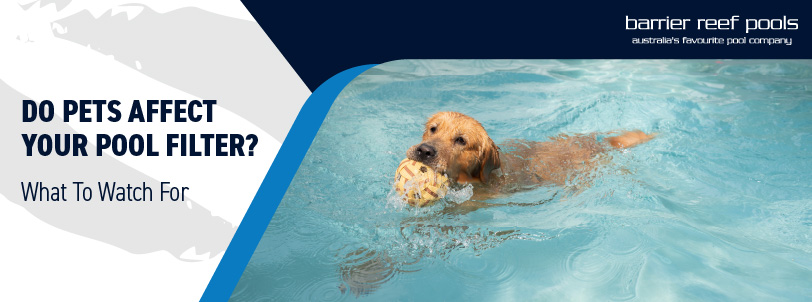
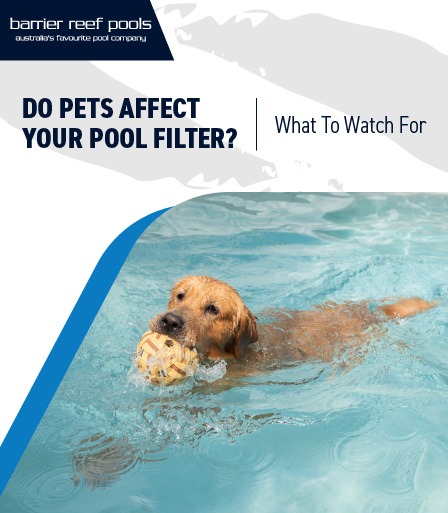
How Pets Interact With Your Pool
Having pets around the pool can bring joy—but it also introduces new considerations for pool owners. Dogs, cats, and even curious wildlife can introduce contaminants into the water.
Pet Hair and Fur
One of the most common ways pets impact your pool filter is through shedding. Dog hair, in particular, can accumulate in the skimmer basket and filter. Over time, this reduces water flow and makes your filtration system work harder.
- Tip: Brush your pet before swimming to remove loose hair.
- Tip: Use a pool skimmer net daily if your pet is a frequent swimmer.
Dirt, Mud, and Debris
Pets often track in dirt, leaves, and other debris from the yard. This material can clog your filter and increase chemical demand, as more contaminants require more chlorine or other sanitising agents.
- Tip: Rinse your pet with a hose before allowing them into the pool.
- Tip: Keep the pool area clean and consider a dog-friendly mat near entry points.
Oils and Saliva
Pets naturally secrete oils through their skin and coat. When combined with saliva, these substances can create a thin film on the water’s surface, affecting water clarity and increasing the need for chemical balancing.
Pool Filter Types and How They Handle Pets
Different pool filter types respond differently to pet-related contaminants. Understanding your filter can help you prevent damage and maintain water quality.
Sand Filters
Sand filters are effective at trapping larger debris, but fine pet hair can pass through or accumulate quickly. Regular backwashing is essential if pets use the pool frequently. Sand filters are durable and well-suited for pools with heavy usage, but the extra strain from pets may shorten intervals between maintenance cycles.
Cartridge Filters
Cartridge filters can trap smaller particles, including pet hair. However, they need more frequent cleaning when pets are swimming regularly. Removing and hosing off cartridges can prevent clogging and extend their lifespan. Cartridge filters are often easier to clean than sand filters but still require attention if pets swim often.
DE (Diatomaceous Earth) Filters
DE filters provide excellent filtration, capturing fine hair and dirt particles. Pets may require you to increase the frequency of cleaning the grids to maintain water flow and efficiency. While DE filters can handle very fine debris, oils and fur from pets may still reduce efficiency if maintenance is neglected.
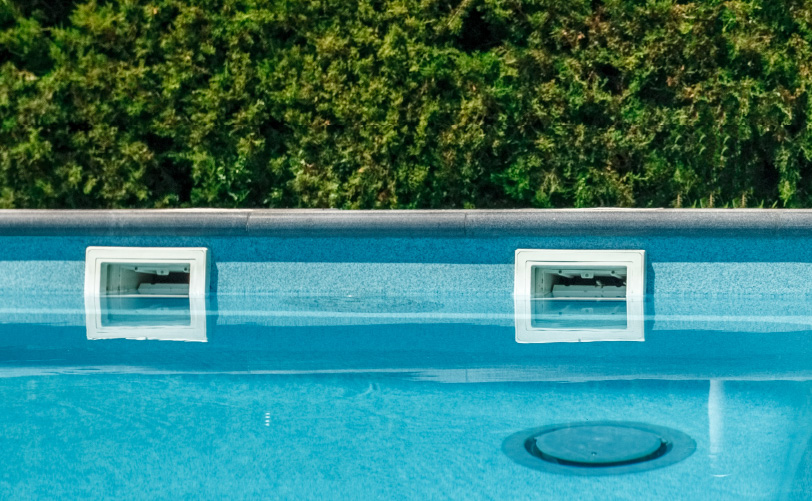
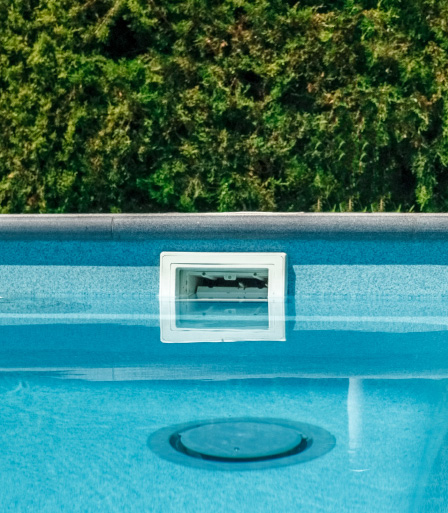
Signs Your Pool Filter Is Struggling With Pet Use
Monitoring your pool filter’s performance is key to catching issues early.
Reduced Water Flow
If water circulation seems slower than usual, hair or debris may be obstructing the filter. Reduced flow can affect pool cleaning systems and overall water quality, sometimes resulting in the pump working harder than normal.
Cloudy or Dirty Water
Pets can introduce oils and organic matter that lead to cloudy water. Regular testing and maintaining proper chemical balance helps, but cleaning the filter is also crucial. Cloudy water can indicate an overworked filtration system, especially after multiple pets have been swimming.
Increased Chemical Use
Noticeably higher chlorine or sanitizer use can indicate that pet oils and debris are stressing your filtration system. If your pool requires more chemicals than usual, your filter may not be handling the extra load effectively.
Frequent Skimmer Cleaning
If the skimmer basket fills quickly with hair and debris, this is a strong indicator that pets are contributing to filter strain. Regular emptying helps maintain water circulation and reduces pressure on the main filter.
How to Protect Your Pool Filter When You Have Pets
Maintaining a pool with pets doesn’t have to be difficult. A few simple steps can protect your filter and improve water quality.
Pre-Swim Rinse
Rinsing pets before swimming helps remove loose hair, dirt, and oils. A quick rinse significantly reduces the load on your pool filter. This step is especially important for dogs with long or thick coats, as more hair and oils will enter the water without preparation.
Regular Filter Maintenance
Check and clean your pool filter more frequently if pets are swimming regularly.
- Sand Filters: Backwash weekly or as needed.
- Cartridge Filters: Remove and hose off at least every two weeks.
- DE Filters: Check grids and replace DE powder as required.
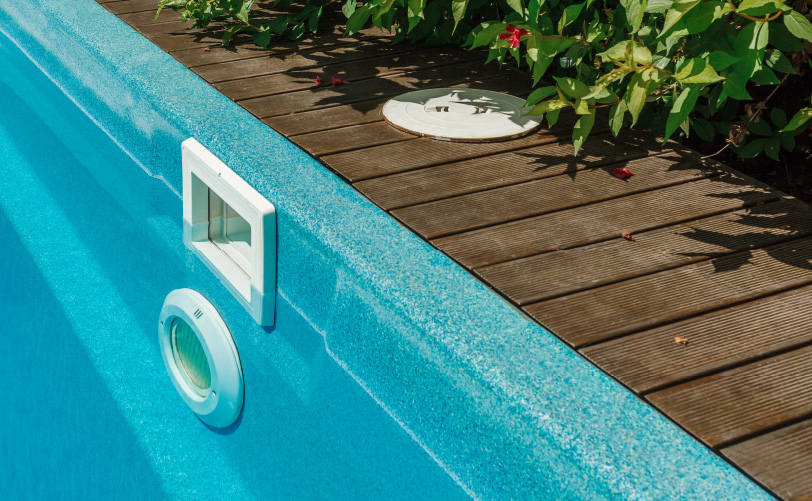
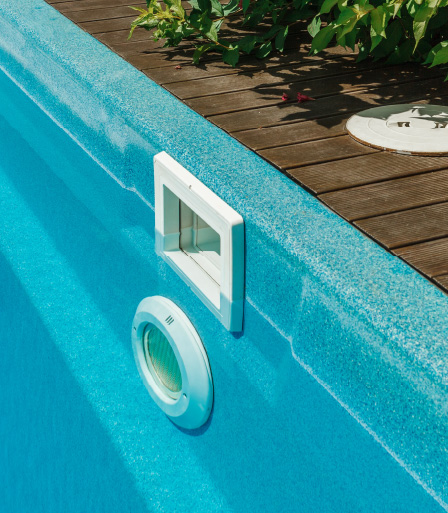
Skimmer Nets and Leaf Traps
Using a skimmer net or leaf trap near the pool edge catches pet hair and debris before it reaches the filter. This simple step prolongs filter life and keeps water clean. Regular skimming is crucial for pools with multiple pets or frequent visits from pets.
Pool Covers
A pool cover keeps pets from accessing the pool unsupervised and reduces debris accumulation. Covers also protect your pool when it’s not in use, saving chemical and energy costs. Additionally, covers help prevent accidental contamination from pets who may enter the pool area unexpectedly.
Outdoor Hygiene
Keeping pets’ paws, fur, and coat clean before swimming reduces dirt and bacteria entering the pool. Simple practices like washing paws and brushing fur regularly minimise the impact on your filtration system.
Dog-Friendly Pool Tips
For dog owners, there are extra considerations:
- Designated Pet Entry: Provide a ramp or shallow entry to minimise splashing and dirt entry.
- Rinse Off: Always rinse dogs before and after swimming to reduce filter load.
- Brush Outdoors: Remove excess fur before entering the pool area.
- Regular Pool Cleaning: Skim daily and vacuum weekly for optimal water clarity.
- Monitor Behaviour: Some dogs may chew toys or shed excessively in the pool; monitor activity to minimise debris.
Benefits of Pet-Friendly Pool Practices
Following these steps not only protects your pool filter but also ensures a safe, clean swimming environment for your pets.
- Longer Filter Life: Less hair and debris accumulation means fewer breakdowns and repairs.
- Better Water Quality: Cleaner water reduces skin and eye irritation for both humans and pets.
- Reduced Chemical Costs: Efficient filtration reduces the need for excessive chemicals.
- Peace of Mind: Knowing your pool is maintained effectively allows you and your pets to enjoy swimming safely.
Conclusion
Pets are wonderful companions, but they can affect your pool filter if precautions aren’t taken. Hair, oils, dirt, and debris can reduce water flow, cloud water, and increase chemical use. By brushing pets before swimming, rinsing them off, maintaining your filter regularly, and using tools like skimmer nets and pool covers, you can enjoy pet-friendly pool fun without compromising water quality.
With these steps, your pool can stay clean, safe, and inviting—even with pets in the mix. Consistent maintenance ensures your pool remains a place of enjoyment for both humans and furry friends.



